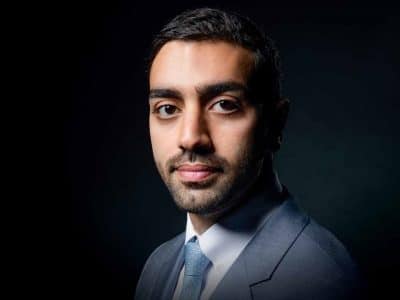Sitting on a functional chair in a café in a gym, a chair a thousand sweat-soaked backsides have already occupied, Micky Jagtiani, the Gulf’s richest Indian, looks a little out of place. He’s tired, or he looks it, and the morning sun which pours in through panoramic windows — beyond which housewives plough up and down a rectangular pool in the hope of slowing time — lights him harshly.
Jagtiani, of course, is in this gym for no other reason than he has just bought it, it and all the other Fitness First franchises in the Middle East. He’s not here to try out the treadmills. He is here to make money, lots of it, which is something he does better than virtually anyone else.
With his Landmark Group, he’s the king of retail in the Gulf. He’s been here since 1992, when he set up his company with $3,000 and today he is the owner or regional owner of 23 major brands and more than 900 stores in 15 countries. He employs more than 31,000 people, all of whom played a part in generating a turnover of $3.2bn last year, and 25 percent growth. Personally he is believed to be worth in the region of $2.6bn.
Getting access to Jagtiani, unsurprisingly, is not easy. When I tell him, following the press conference, that I have been trying for two years, he seems genuinely amazed. “Two years, really? Wow. Such a long time,” he says, widening his eyes at the very idea. “To talk to me?”
Jagtiani is a complex man, you don’t need to meet him for long to work that out. Obviously enormously driven to constantly push the boundaries of his success by all the measures of capitalism, he will also talk, at the drop of a hat, of his desire to discover himself and to give it all up to devote himself to charity work in the slums of Chennai and Mumbai. If you give him the chance, he will tell you he has no love for money, at least not for anything it can do for him personally.
And then he will add he is looking to spend about $1bn of it in the coming twelve months, buying up other people’s companies.
One moment he is saying, when asked what he would like to do next year: “What I would really like to do is spend more time discovering myself, you know? Not just the business. Who am I? What is the meaning I have in life? These sorts of things, rather than just push, push, push, make more, more, more money.”
And, immediately afterwards, when asked when he thinks he will have made enough money, he roars with laughter. “Never,” he says, emphatically.
Micky Jagtiani’s story is a fascinating one. He was certainly not born into wealth, and anyone who has struggled in their twenties to make ends meet should be able to find some inspiration in the manner by which he rose to the top.
He says: “When I was 21, I used to clean hotel rooms in Earls Court, the cheapest part of London, eight people to a room. I also used to drive minicabs — don’t tell anyone, I didn’t have an official minicab licence.”
He was in London studying to become an accountant, something he loathed. He remains fond of London — he says he is still looking to buy companies there because he feels comfortable with the way life is conducted in the city — but, financially, times were hard for him back then. Money, however, was not the top of his list of worries.
“I was an orphan by the age of 26. My brother, one year older than me, at 23 passed away due to leukemia. Nine months later, my father died of a heart attack, six months later my mother had terminal cancer. And that was my entire family. You learn to be detached. You go through a very difficult experience,” he says.
It was an experience, he believes, that pushed him towards Buddhism, a religion, or set of beliefs, that helped him to make the most of adversity, and to turn it, as far as was possible, to his advantage.
“In Buddhism they say you only learn through hardships, and that your best friend in life is your hardship and sorrow. So when you get it, welcome it because it is going to teach you more about life than anything else. Money has no meaning to me. My ambition is to die without a penny to my name. I will give a lot to my family. A lot of it I will give to charity,” he says.
Jagtiani hardly ever gives interviews — but nevertheless is easy with his time, and open in his answers. That clear-eyed gaze, honest, transparent, is disarming at first — it must be the trait acquaintances take away — but important. There is something in his manner that seems to want to make very clear he has nothing to hide. Certainly, he holds eye contact like no one else this correspondent has ever interviewed.
He says: “I live my life like Gandhi. My lifestyle is very simple. I sleep on the floor. I run my life with one key, I am very transparent, and I believe a lot in Buddhism. I like to do a lot of social work… All my friends who have money, they have family problems, they have problems with their kids. If they don’t get a first class air ticket they fall to pieces. If they don’t get their best designer clothes they get nervous. To me these things are materialistic and not important. I only collect two things in life: Buddhas and businesses.
“I have a simple life. That is the secret to being peaceful. I run my whole life with one key. I don’t lock my office, drawers, my house, I don’t lock my cupboard. Everything is open and transparent. I drive one car. I don’t have a yacht, or a jet, or anything like this. If I wanted to, I could afford it, but I don’t care for it.”
Last time I met Jagtiani, he was widely tipped to be about to swoop for British high street fashion brand New Look. For whatever reason, the deal didn’t happen. When I remind him of it, he says that he has not lost interest. He is still looking at the company.
He says: “We still are. But I can’t talk about that, because it is a public listed company. We are still looking at opportunities as and when they come. We will explore them. We prefer London, because we understand England, we have worked in England before. We feel comfortable with the DNA of England.”
Asked if the financial crisis has left lots of bargains out there for companies as wealthy as his to snap up, his eyes widen again with incredulity before he laughs.
“There are no bargains, unfortunately. If you hear of any, please tell me.”
And then, once the laughter has subsided: “We are in an acquisition mood, we are fairly liquid. We have the money to acquire companies. Now what are we going to acquire? It all depends on what is available and how much it is on the market for. So we don’t have a plan in that sense, but if one thing is sure it is going to be hospitality and retail.”
Pressed any further on which companies he is looking to buy, Jagtiani not surprisingly becomes extremely vague, although his words will no doubt be interesting to anyone in negotiations with him now.
He says: “It is very difficult to say. It could be maybe five restaurants, and some could be bigger opportunities like Fitness First, some could be publically quoted companies in England. It all depends on what [opportunities] you get and we might have to borrow extra in order to have the equity.”
No interview with Micky Jagtiani — or Mukesh to his friends — would be complete without a mention of his charity work. The desire to give something back to his native country certainly seems to burn brightly in him — to the extent that he underwrites a foundation that funds the education of more than 100,000 children in slum schools in India, and is also the main benefactor for several orphanages. In the past, he has told me that when he goes to India, he sleeps on the floor in these orphanages — something he said helped to keep him grounded.
He said: “In India wealth is so poorly distributed. There are the very rich and then there are the very poor, which is the rest. I went to a terrible Bombay slum in which children work eleven-hour days on one meal a day. I was there from ten in the morning until seven in the evening. I just sat down trying to understand the meaning of poverty. Why does it happen? What is the solution?
“I sat there and meditated in this Bombay slum, and when I say a slum, it was a very bad slum. And when I got back to my hotel I got changed and went to a party where there were 1,400 guests and everyone was dripping in gold.”
He raises his hands in bewilderment. “There was a girl there who fainted because she had 19 kilos of gold on her.”
Jagtiani dropped out of accountancy college in London long before the exams, and went on to become a billionaire. From a difficult start, his life has turned out to be an amazing one, filled with success. But this story, of the disparity between enormous wealth and privilege — human beings literally fainting beneath the weight of their wealth — and the poverty of the slums, seems to capture the conflict within the man. He’s a very human billionaire.



